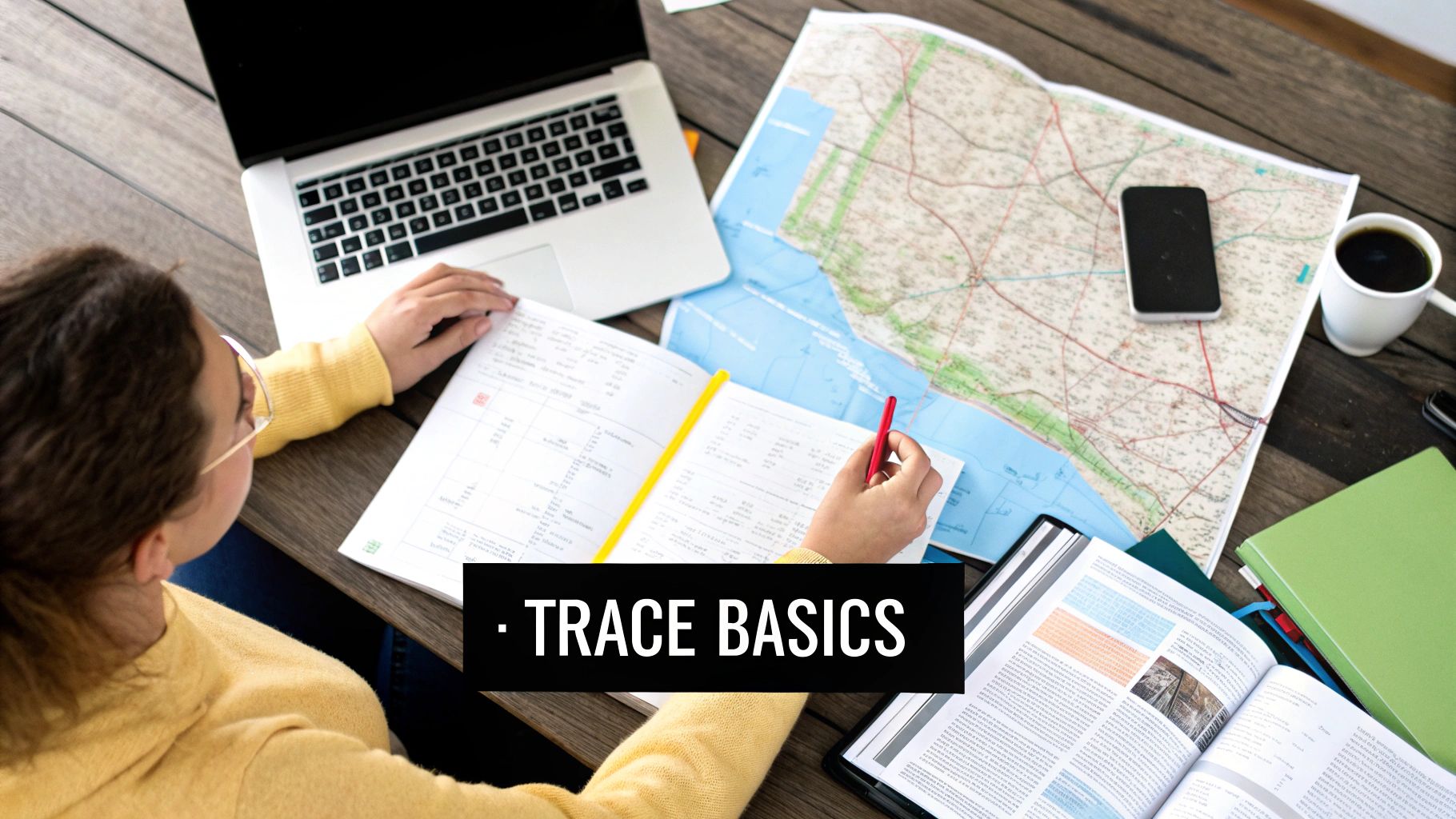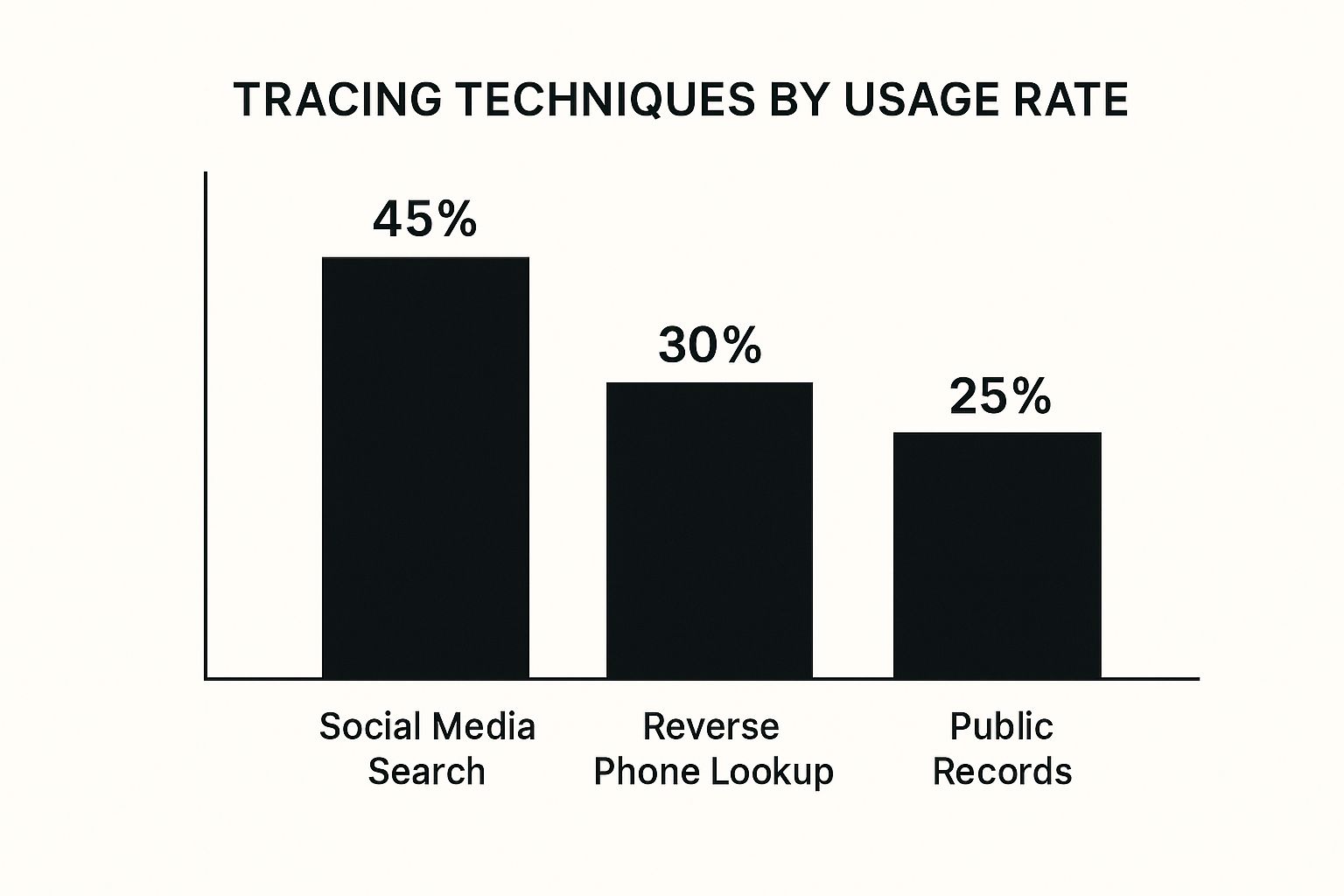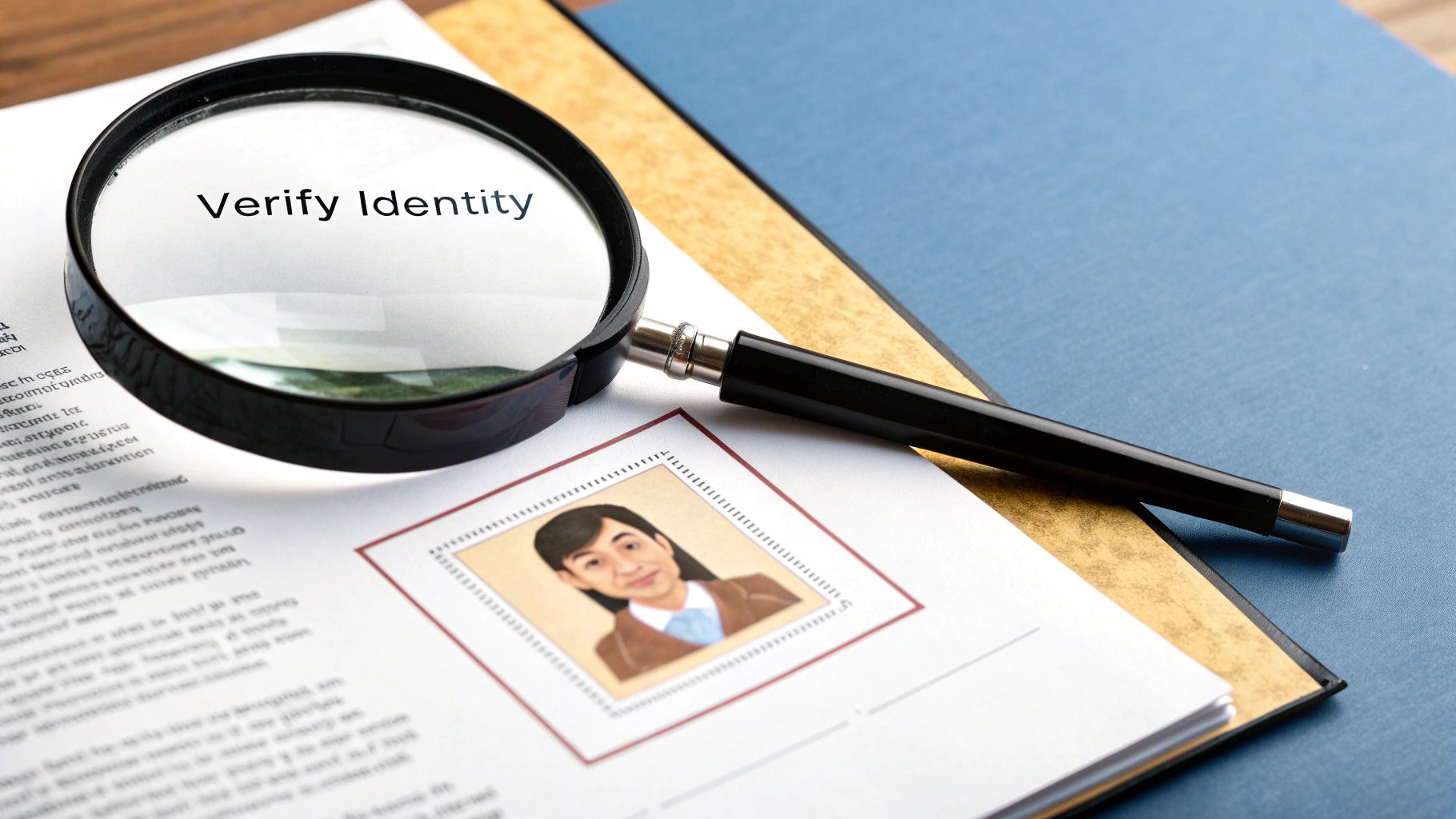Trying to find someone in the UK requires a blend of savvy online searching, digging into public records, and knowing when it’s time to call in the experts. The golden rule is to always start with a legitimate reason and stay firmly within the bounds of the law, making sure every step you take respects the person’s privacy.
Your Starting Point: Understanding the Legal Landscape

Before you type a single name into a search bar, you need to get your head around the legal and ethical lines you simply can’t cross. The very first thing to figure out is why you’re looking for this person. Your motive is everything; it shapes your methods and, crucially, determines if what you’re doing is actually legal.
People’s reasons for tracing someone can be deeply personal or purely professional. You might be hoping to reconnect with a family member you lost touch with years ago. Or perhaps you’re a landlord trying to find a former tenant who left owing rent, or a solicitor needing to locate a witness for a legal case. These are all generally seen as legitimate grounds to start a search.
The key is that your intent must be lawful. Any action that could be seen as stalking, harassment, or intimidation is illegal and comes with severe penalties. A crucial first step is understanding privacy regulations that dictate how personal information can be accessed and used. The line is usually quite clear: finding someone to serve them with legal documents is fine, but finding them to cause them distress is absolutely not.
Legitimate Reasons for Tracing Someone
It’s vital to have a solid, valid purpose before you begin. Some common and acceptable scenarios include:
- Reuniting with Family or Friends: Searching for estranged relatives or old school friends you’ve drifted apart from.
- Debt Recovery: Tracking down debtors who have moved on without leaving a forwarding address.
- Legal Processes: Locating beneficiaries named in a will, witnesses needed for a court case, or defendants in a lawsuit.
- Checking on a Missing Person: If you have a genuine concern for someone’s welfare, knowing how to proceed is key. You can find more on the official process here: https://www.ukprivateinvestigators.com/missing-person-police-report/
Think of your reason as the ethical foundation for the entire search. If your purpose is sound and lawful, you can move forward confidently. If it even hints at harassment or invading privacy, you need to stop right there.
The Importance of Ethical Boundaries
Respecting someone’s privacy isn’t optional. Just because a piece of information is publicly available doesn’t give you a free pass to use it however you want. For example, gathering lots of different data points to build a detailed profile for the purpose of harassment is a serious ethical violation.
You have to approach this task with integrity. Focus only on finding the specific information you need to achieve your legitimate goal, and nothing more. This ethical compass is what will keep your search on the right side of the line from the very beginning.
2. Start with What You Know: Building Your Foundation
Every successful search starts right where you are, with the information you already have. Before you even think about firing up a search engine or diving into public records, the first—and most important—step is to pull together every single detail you can remember about the person.
Think of it as assembling the corner pieces of a jigsaw puzzle. This initial groundwork is what turns a vague idea into a focused, actionable plan. Getting this right from the start saves you from chasing dead ends based on flimsy information. It’s the difference between a methodical search and a wild goose chase.
The Core Details
Let’s begin with the absolute essentials. These are the non-negotiable bits of data that will anchor your entire search. Even if you only have one or two, get them down on paper.
- Full Name and Any Aliases: Jot down their complete legal name. Don’t forget any nicknames they went by or, crucially, a maiden name if it applies.
- Date of Birth: A specific date of birth is gold dust. It’s one of the best tools for narrowing down results and confirming you’ve found the right person. If you don’t have it, even an approximate age is a huge help.
- Last Known Address: An old address, even one from decades ago, can be a key that unlocks a whole trail of new information, from property records to forwarding details.
- Old Contact Details: That old mobile number or forgotten email address? They might still be linked to social media profiles or other online accounts. If a phone number is all you have to go on, our guide on how to find an address from a telephone number can point you in the right direction.
Broadening the Search: Beyond the Basics
With the core facts established, it’s time to think a little wider. More often than not, a breakthrough comes from a seemingly minor detail that connects a person to a specific place, time, or group of people.
Think about their past. Where did they work? What schools or universities did they go to? Were they into any particular hobbies or part of any clubs? You’d be surprised what you can find. Also, try to recall the names of close friends, family members, or even ex-partners. Every single one of these details is a potential search term that could crack the case open.
Your goal here is to create a simple “profile” of the person. This isn’t just a random list; it’s a strategic document that will guide every search you make from here on out, keeping your efforts sharp and efficient.
Tracing people has a surprisingly long history in the UK. The state’s interest in knowing where people were and what they were doing goes back a long way, especially with the introduction of the Penny Post in 1840, which opened up new ways to monitor communications. Over the years, various government acts have formalised these practices, showing a clear link between state power and the ability to locate individuals. If you’re curious, you can find a lot more about the history of mass surveillance in the UK on Wikipedia.
Delving into Public Records and Official Archives
Once you’ve organised the initial details you have, the next logical port of call is usually official records. The UK is home to an incredible wealth of public archives that can give you solid, verifiable information. These records are often the bedrock of a professional search, helping to confirm addresses, family ties, or pivotal life events.
It’s tempting to jump straight onto social media, and many people do. In fact, you can see just how common different starting points are.

While the digital route is popular, the data clearly shows that a huge chunk of searches still lean on official sources like public records. Why? Because they’re often far more reliable.
Tapping into the Electoral Roll
The Electoral Roll is, without a doubt, one of the most powerful resources for pinning down a current address. It’s a list of everyone registered to vote, along with their address.
You need to know there are two versions: the full register and the open register. The open one is sold for commercial use but is often incomplete. For a serious search, your best bet is to view the full register, which you can usually do at a local library or your council office.
Key Government Databases and What They Tell You
Beyond the voter lists, several government databases hold priceless information. Getting access is typically straightforward, though you might need to pay a small fee for official copies of documents.
- General Register Office (GRO): For anyone in England and Wales, this is the go-to for birth, marriage, and death records. A birth certificate can confirm a date of birth and reveal a mother’s maiden name. A marriage certificate gives you details about a spouse. These are the kinds of golden nuggets that can completely redirect a search.
- Companies House: Think the person you’re looking for runs a business or is a company director? Companies House is an absolute must. You can search for free and often find a director’s registered correspondence address, their month and year of birth, and a list of other companies they’re involved with.
- The Land Registry: For a small fee, you can find out exactly who owns a property in England and Wales. This is perfect for checking if someone still lives at a last known address. It can also open up new leads if they’ve recently bought or sold a property, giving you a new trail to follow.
To give you a better idea of how these databases stack up, here’s a quick comparison.
UK Public Records Search Comparison
| Record Type | Information Provided | How to Access | Best Use Case |
|---|---|---|---|
| Electoral Roll | Name and current address of registered voters. | Local library or council office (full register); online services (open register). | Confirming a person’s current or very recent address. |
| General Register Office (GRO) | Details on births, marriages, and deaths, including dates, locations, and family names. | Order certificates online via the GOV.UK website. | Finding family connections, maiden names, and confirming key life events. |
| Companies House | Director names, correspondence addresses, birth month/year, other business interests. | Free online search on the Companies House website. | Tracing business owners or confirming a professional address. |
| The Land Registry | Property ownership details, sale price, and date of purchase. | Online search via the HM Land Registry portal for a small fee. | Verifying property ownership at a known address or tracking property moves. |
As you can see, each record type serves a distinct purpose. The real magic happens when you start cross-referencing the information between them.
Combining intelligence from multiple sources is the key. An old address from one record might unlock a new property search on the Land Registry, which in turn gives you a new area to focus on. It’s all about connecting the dots.
For those tracing biological relatives or trying to understand their heritage as part of a search, you can go even deeper. Exploring DNA testing for ancestry can uncover unique family connections that paper records could never reveal. It’s a completely different approach, shifting from archives to genetics, but it can open up avenues you never thought possible.
Mastering Your Digital Detective Work

Just about everyone leaves a digital footprint these days. The real skill is knowing how to read it. When you need to trace someone, moving beyond a simple Google search of their name can unlock a surprising number of leads, helping you piece together their online life into a coherent trail.
Your first move should always be a smart search engine query. Don’t just throw a name in and hope for the best. Use search operators to refine your results. For example, putting a name in quotation marks, like “John Smith”, forces Google to look for that exact phrase. You can get even more specific by adding a location or a former employer, such as “John Smith” + “Manchester accountant”. This simple trick can cut through the noise immediately.
Social Media Sleuthing
Social media platforms are absolute goldmines for information, but you need a strategic approach. Each network offers different clues, depending on how people use it.
- LinkedIn for Professional Connections: This is my go-to for finding people based on their career. You can search for their name alongside companies they’ve worked for or industries they’re in. Don’t forget to check their connections list; you might find a mutual contact who can point you in the right direction.
- Facebook for Personal Networks: Think about old school groups, pages for their local town, or even hobby communities they might have joined. Even if a profile is locked down, their friends list or photos they’ve been tagged in might still be public, giving you a glimpse into their current social circle.
- Instagram for Visual Clues: A public Instagram account can be incredibly revealing. People often geotag photos, showing you exactly where they’ve been. Take a look at who they follow and who follows them back—these connections often mirror their real-life relationships.
Along the way, you’ll likely uncover an email address. Before you rely on it, you need to know if it’s even active. Learning how to check if an email address is valid is a crucial step to confirm you’re on the right path.
Remember to be sceptical of everything you find. A profile picture could be ten years old, and a tagged location might be from a past holiday. Always try to cross-reference what you find on one platform with information from another before you accept it as fact.
Evaluating Online Information
The internet is awash with old, inaccurate, and downright misleading data. Finding a potential lead is just the start of the job. Now, you have to verify it.
Ask yourself critical questions. Does the location mentioned in a recent Facebook post line up with the area suggested by their LinkedIn profile? Do the people they’re interacting with online match up with known family members or old friends? It’s this kind of critical thinking that separates a successful search from a dead end. Be patient and build your case one confirmed piece of information at a time.
It’s also worth noting the UK’s unique data landscape. Authorities have significant access to digital records, and tracing techniques are heavily shaped by government legislation like the Investigatory Powers Act 2016. This act mandates the collection of Internet Connection Records for all UK users. Programmes such as Tempora have created a vast repository of data, including web histories and social media activity, showing just how deep our digital footprints go. You can read more about the UK’s stance on mass surveillance and its history on Wikipedia.
When to Call in a Professional Tracing Agent

You’ve scoured public records, chased down every digital breadcrumb, and exhausted your online search skills, but the trail has gone cold. It happens. This is the point where many people hit a wall, and it’s often the right moment to consider bringing in a professional.
Deciding to hire a specialist tracing agent or private investigator is a big step, but it can be the most efficient and effective way to get results. They operate on a different level, with access to resources and databases that are simply off-limits to the public. These aren’t just glorified search engines; they’re professional-grade systems that aggregate data from countless verified sources, allowing an agent to connect dots with a speed and accuracy you just can’t match.
Beyond the tools, it’s their experience that really counts. A seasoned agent knows how to read between the lines, spot inconsistencies that look like dead ends, and follow up on clues an untrained eye would miss. They also have a deep understanding of the legal framework governing information access here in the UK, which keeps the search both ethical and effective.
Identifying the Right Time for an Expert
So, how do you know when it’s officially time to hand over the search? Certain situations almost always call for professional intervention.
- Complex or High-Stakes Cases: If you’re tracing a beneficiary for a will or trying to find a key witness for a court case, the consequences of getting it wrong are significant. An expert ensures the trace is conducted properly.
- The Trail is Completely Cold: You have no recent address, no social media activity, and no mutual friends to ask. Professionals are masters at picking up faint, old trails.
- Safety is a Concern: If you believe the person might be vulnerable, at risk, or could react badly to being found, a professional acts as a discreet and safe buffer.
- You Just Don’t Have the Time: A proper trace is a huge time commitment. If you can’t give it the focus it needs, an agent is the practical solution.
Handing over a search doesn’t mean you’ve failed. It means you’re making a strategic decision to use the best tools available for the job and prioritising a successful outcome.
When you do decide to hire someone, do your homework. Look for an agent with transparent pricing, professional accreditations, and a solid reputation. This guide on deciding whether a private investigator is the right choice for you is a great place to start.
It’s also worth remembering that tracing people is a cornerstone of law enforcement, especially in serious criminal investigations. For example, police data for the year ending March 2025 showed an 11% rise in sexual offences in England and Wales. Finding suspects in these cases relies on expert tracing methods, from digital forensics to on-the-ground investigation, highlighting just how critical this work is for public safety. You can find more on these crime statistics on the official ONS website.
Common Questions About Tracing People in the UK
When you first decide to find someone, it’s completely normal for a flood of questions to pop into your head. How much will this cost? Is what I’m doing even legal? Getting your head around the rules and what to expect is the first step to a successful—and ethical—search. Let’s break down some of the most common queries I hear.
Is It Legal to Trace Someone?
This is usually the first thing people worry about. The short answer is yes, it’s perfectly legal to trace someone without their express permission, but there’s a crucial condition: you must have a lawful and legitimate reason to do so.
Basically, your motive matters. You can’t be looking for someone to harass them, stalk them, or for any other illegal purpose. For example, trying to find an old school friend you’ve lost touch with is fine. Locating a debtor who owes you money is also a legitimate reason.
The methods you use have to be above board, too. You should be sticking to information that’s already in the public domain, like online searches and public records, or using professional services that operate within the law. UK privacy regulations, like the GDPR, are incredibly strict, so it’s vital to ensure you’re not crossing any lines.
What Should I Expect to Pay?
The cost of tracing someone can swing wildly, from absolutely nothing to hundreds of pounds. It all comes down to how difficult the search is and the approach you take.
Here’s a rough idea of what you might be looking at:
- Free Options: A lot can be uncovered just by using search engines, digging through social media profiles, and checking public databases like Companies House. These methods only cost you your time and are a fantastic place to start.
- Low-Cost Records: If you need to access official documents, there are usually small fees involved. Ordering a birth certificate from the GRO or pulling property details from the Land Registry will typically set you back less than £15 per record.
- Professional Help: Bringing in a tracing agent or a private investigator is the priciest route, but it’s often the quickest and most reliable. A straightforward address trace might start around £150, while a more complex case could easily exceed £500.
My advice? Start with the free resources. Gather every scrap of information you can before you even think about paying for records or professional help. This groundwork can save you a lot of money in the long run.
I’ve Found Them… Now What?
What happens if you find the person, but suddenly feel unsure about making contact? This is an incredibly common feeling, especially in situations involving estranged family members or old flames. Finding someone doesn’t mean you have to pick up the phone straight away.
The most important thing to do is pause. Take a breath and think about what you really want. You’re in control here. For some people, just having the peace of mind that the person is safe and well is enough.
If you do want to reach out but feel nervous, think about using an intermediary. This could be a solicitor or the tracing agent who found them. They can make a sensitive, initial approach on your behalf, pass on a message, and see how the person responds. It’s a great way to manage the situation carefully, giving them space and the choice to reply without feeling pressured.
When your own search hits a wall or the situation calls for a delicate touch, UK Private Investigators has the experience and tools to step in. Our team can locate people quickly and lawfully, giving you the answers you need. Find out how we can assist with your search today.

